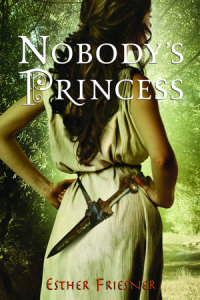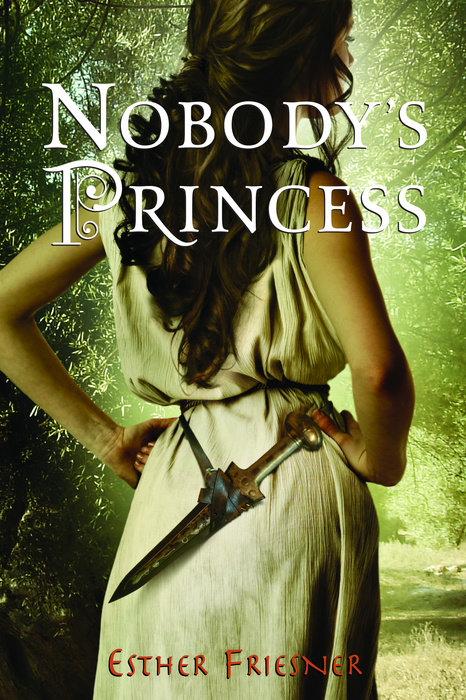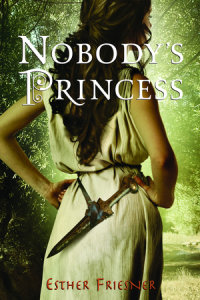Nobody's Princess
Nobody's Princess is a part of the Princesses of Myth collection.
Helen of Sparta wants to be more than a princess and a pretty face—she wants to be a hero.
The traditions of ancient Sparta would have Helen know her place: a beautiful princess, a loyal daughter, a perfect bride. But Helen wants adventure, and she's not looking back. Not one to count on the gods to take care of her, she sets out to see the world and seek her own fate with steely determination. Her rebellious will makes Helen dangerous enemies—such as the self-proclaimed "son of Zeus" Theseus—but it also gains her true friends, from the famed huntress Atalanta to the young priestess who is the Oracle of Delphi. If she is strong enough, if she is cunning enough, if she is brave enough, Helen will find her destiny . . . but what does destiny have in store for her?
In Nobody's Princess, author Esther Friesner deftly weaves together history and myth as she takes a new look at the girl who will become Helen of Troy. The back of the book includes further facts about Helen of Troy and Ancient Greece. Hand to readers who love Tamora Pierce and Leigh Bardugo, particularly if they just finished Wonder Woman: Warbringer and want to know more about Helen of Troy.
"A must-read for fans of fantasy and mythology."—VOYA
"Along the way, Friesner skillfully exposes larger issues of women's rights, human bondage, and individual destiny. It's a rollicking good story."—Booklist
An Excerpt fromNobody's Princess
PART I
Sparta
1
A Sacrifice to Artemis
I grew up with the gods all around me. When the dawn came, it was because the goddess Eos brought it. The sun was Apollo’s chariot, and the crescent moon was the hunting bow of his sister, Artemis. Every river had its god, and so did each of the winds that blew from north, south, east, and west.
Ione was the first person to teach me about Zeus, king of all the gods; his queen, Hera, who blessed marriages; his brother Poseidon, who was master of the great ocean; and his other brother, Hades, who lived deep under the earth and ruled the dead. But most of her stories were about Demeter, the goddess who gave us bountiful harvests. That was understandable. Ione was a farmer’s wife.
Even though we were supposed to revere all of the gods equally, most people honored some gods more than others. Why would a fisherman bother making a sacrifice to Hephaestus the armorer, god of the forge, when he could be praying to Poseidon for smooth seas and full nets? Why would a metalworker waste time worshipping Poseidon when he could be asking for Hephaestus’s blessing?
Everyone did it, including me. Ever since the dedi- cation of the rooftop shrine, Aphrodite was my favorite. When I was five, I made a little clay image of her and set it on a table in the room I shared with my sister. When Clytemnestra saw it, she sniffed. “What’s that supposed to be?”
“Aphrodite,” I told her.
“It can’t be Aphrodite. It’s ugly.” She sounded pleased with herself. “Throw it away.”
“It is not ugly!” I cried, reaching out protectively for my little goddess. Unfortunately, I moved too quickly. Instead of cupping the image safely between my palms, I knocked it off the table and sent it tumbling to the floor. The unbaked clay shattered to bits and I burst into tears.
“You’re such a baby, Helen,” Clytemnestra said. “Why are you crying over that ugly thing? If you want a real Aphrodite, just tell Papa. He’ll get you a good one.”
But I still cried, because I didn’t want an image of the goddess that someone else had made. I wanted a statue that was my goddess. The next day, I made another Aphrodite and hid it in the bottom of my clothes chest, safe from my sister’s sneers.
By the time I turned seven, I’d learned that Ione had been partly right about the gods. They weren’t all as kind as Aphrodite. Just as some people liked one god more than another, some of us didn’t like certain gods at all.
My father, Tyndareus, didn’t like Artemis, goddess of the moon in heaven, the hunt on earth, and the dark powers of magic from the underworld. I first heard him speak against her during a great banquet that took place ten days before the feast of the huntress. This was a yearly festival when my mother, Queen Leda, led a procession of maidens to the temple of Artemis and offered up the sacrifice while they danced and sang for the goddess. It was the one shrine in all Sparta where the queen worshipped alone and the king never set foot.
The banquet was being given to honor a group of very important guests, envoys from the island kingdom of Ithaka. I sat beside my mother and heard her tell one of our guests about the coming celebration.
“No men? Really?” the guest replied. “Well, if that’s what pleases Artemis, I suppose you don’t have any choice.”
Even I could tell that he was just making polite conversation. He didn’t really care about the goddess.
My father did care, very much, in his own way. “Oh yes, we must give Artemis exactly what she wants,” he said. He was smiling, acting as if he was joking, but there was something serious under the light words. “She’ll show us no mercy if we don’t. If you ask me, she doesn’t know the meaning of forgiveness.”
“What makes you say that, Lord Tyndareus?” one of the guests asked.
“Oh, the proof’s there, in the stories. Take the tale of the nymph Callisto, for instance. Now, if a goddess chooses to remain a virgin, like Artemis and Athena, I can’t complain about that. I have nothing against virgins.” He paused and winked at the other grown-ups at the banquet. Most of them laughed, including my mother; I had no idea why. “And if Artemis wants the nymphs who hunt with her to be virgins as well, fine. That’s her choice too. But nymphs are beautiful, and the gods love beauty. The gods are also used to taking what they want, even when what they want says no. What chance does a nymph have against a god? Artemis adored Callisto until Zeus forced her to be his lover and left her with child. It wasn’t Callisto’s fault, but did the goddess care? Did she accept the fact that the nymph was Zeus’s helpless victim? No, she just punished her by turning her into a bear! And that is why I leave other people to make sacrifices to Artemis, because I have kinder goddesses to honor.”
“Lord Tyndareus, be careful of what you say!” The icy words rang out through the great hall. The man who dared to admonish my father in his own palace was one of the Ithakan envoys, a terribly serious stick of a man, young in years but old and bitter in spirit. I’d never seen anyone with such a vinegary face. I thought that if he’d ever smile, he’d crack his jaw. I’d seen how his heavy brows drew into a scowl while my father was talking about Artemis, how his mouth became small as an olive pit until at last it burst open with angry words. “The lady Artemis will not be insulted, not even by kings! She demands payment for all offenses, and no one has the power to refuse her.”
“You mean that she’ll take revenge on me? That would only prove my point.” My father chuckled. He made it clear that he was joking, teasing that pompous creature. Everyone else laughed with him.
“Wait,” the man said ominously. “Wait and see what comes of your sacrilege. The huntress’s arrows never miss their target. Remember Niobe!”
My father stopped laughing. He stood up suddenly, his face dark as a thunderhead, and jabbed one finger at the Ithakan. “You dare to talk to me of sacrilege? In my own house, at my own table? You speak Niobe’s name in the presence of my children? The sacred bond between host and guest is all that’s keeping me from snapping your neck right now! Get out of my sight.”
The Ithakan opened his mouth, but one look at the king’s face was enough for him to seal his lips and rush out of the hall. Even though the road from Sparta to Ithaka was long and dangerous, he didn’t wait for his fellow envoys. He was gone by next morning.
The day after the rest of the Ithakan envoys left us, I asked my father why he’d been so angry. He wouldn’t tell me, but when I went to my mother’s room with the same question, she gave me my answer. “Niobe of Thebes was a great queen but a foolish woman. She mocked Leto, mother of Artemis and Apollo, because the goddess had only two children while she had seven sons and seven daughters.” My mother picked me up and held me close, as if I were still a baby. “For her offense, the divine twins slaughtered all her children in a single day. Their arrows cut them down, every one, even when the queen threw herself across the body of her youngest child and begged Artemis and Apollo to take her life instead. There was no mercy, and when Niobe’s children all lay dead, there was no end to her weeping. The gods finally took pity on her and turned her to stone, but her tears for her children still stream down the face of the rock.”


